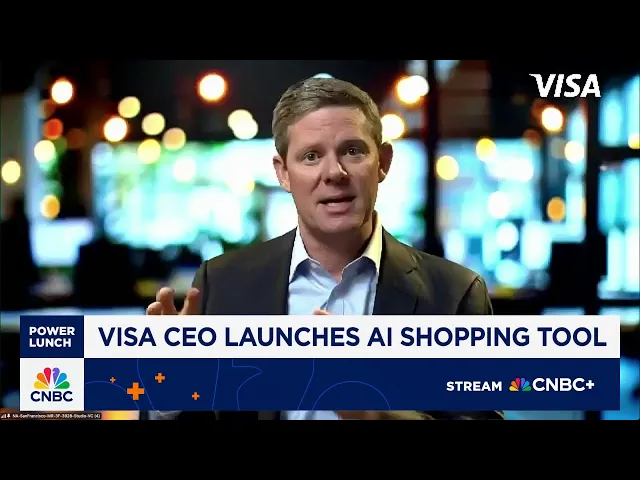Visa CEO: AI shopping will be ‘a lot like self-driving cars’

AI shopping is about to change everything
In a world that's constantly seeking to streamline our daily tasks, Visa has just unveiled a groundbreaking AI-powered shopping solution that could fundamentally alter how we make purchases. During a recent product event in San Francisco, CEO Ryan McInerney revealed a new technology allowing AI agents to securely access credit card information and make purchases on behalf of consumers. This move positions Visa at the forefront of what appears to be an industry-wide shift toward AI-facilitated commerce.
Key developments worth noting:
-
Visa's new system operates behind the scenes, creating secure infrastructure for third-party AI assistants from companies like OpenAI, Anthropic, and Perplexity to make purchases on users' behalf
-
The technology addresses critical fraud protection concerns, which McInerney identified as a primary motivation for partnerships with AI firms
-
Competitors including Mastercard and PayPal have launched similar initiatives in the same week, signaling an industry-wide recognition of AI shopping's imminent arrival
-
Despite mixed earnings results, Visa maintains the consumer remains "resilient" with no apparent slowdown in spending data through April 2024
Why this matters: The "self-driving car" moment for retail
The most compelling insight from McInerney's announcement came when he compared AI shopping to "self-driving cars" – a parallel that captures both the transformative potential and the gradual adoption curve we're likely to witness. Just as autonomous vehicles promise to eliminate the cognitive load of driving, these AI shopping agents aim to remove "the top of the shopping funnel" from our daily lives.
This analogy is particularly apt because it acknowledges that while the technology may seem radical, adoption will likely follow a familiar pattern: initial skepticism giving way to targeted use cases before eventually becoming commonplace. The self-driving comparison also hints at the profound economic implications. When AI can handle routine purchases, it fundamentally changes the relationship between consumers, merchants, and payment processors.
Payment networks like Visa aren't just adapting to this shift – they're actively facilitating it. By positioning themselves as the trust layer between AI systems and financial transactions, they're ensuring their continued relevance in an increasingly automated commercial landscape.
Beyond the announcement: What Visa didn't mention
What's particularly interesting about this development is how it
Recent Videos
How To Earn MONEY With Images (No Bullsh*t)
Smart earnings from your image collection In today's digital economy, passive income streams have become increasingly accessible to creators with various skill sets. A recent YouTube video cuts through the hype to explore legitimate ways photographers, designers, and even casual smartphone users can monetize their image collections. The strategies outlined don't rely on unrealistic promises or complicated schemes—instead, they focus on established marketplaces with proven revenue potential for image creators. Key Points Stock photography platforms like Shutterstock, Adobe Stock, and Getty Images remain viable income sources when you understand their specific requirements and optimize your submissions accordingly. Specialized marketplaces focusing...
Oct 3, 2025New SHAPE SHIFTING AI Robot Is Freaking People Out
Liquid robots will change everything In the quiet labs of Carnegie Mellon University, scientists have created something that feels plucked from science fiction—a magnetic slime robot that can transform between liquid and solid states, slipping through tight spaces before reassembling on the other side. This technology, showcased in a recent YouTube video, represents a significant leap beyond traditional robotics into a realm where machines mimic not just animal movements, but their fundamental physical properties. While the internet might be buzzing with dystopian concerns about "shape-shifting terminators," the reality offers far more promising applications that could revolutionize medicine, rescue operations, and...
Oct 3, 2025How To Do Homeless AI Tiktok Trend (Tiktok Homeless AI Tutorial)
AI homeless trend raises ethical concerns In an era where social media trends evolve faster than we can comprehend them, TikTok's "homeless AI" trend has sparked both creative engagement and serious ethical questions. The trend, which involves using AI to transform ordinary photos into images depicting homelessness, has rapidly gained traction across the platform, with creators eagerly jumping on board to showcase their digital transformations. While the technical process is relatively straightforward, the implications of digitally "becoming homeless" for entertainment deserve careful consideration. The video tutorial provides a step-by-step guide on creating these AI-generated images, explaining how users can transform...
